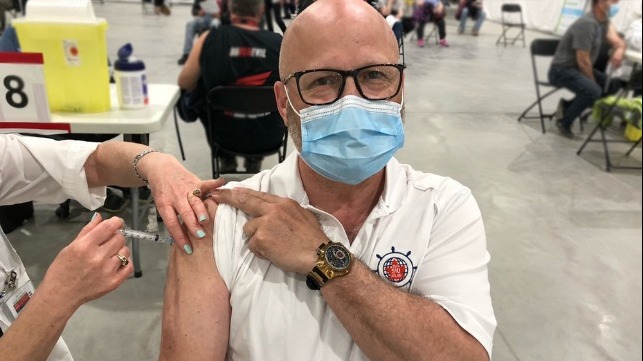Seafarers Have Low Vaccinations Rates as Crew Change Delays Persist

Despite tremendous efforts in the rollout of COVID-19 vaccines in large shipping nations in Europe, Asia, and North America, the share of seafarers vaccinated remains too low. The inability to get seafarers vaccinated is also likely contributing to the persistent crew change crisis according to new data from the monthly update on the Neptune Declaration Crew Change Indicator.
Believing that vaccination rates will be a critical part of addressing the crew change challenges, the organizers of the monthly survey sought to aggregate data from the 10 leading ship managers to determine the rate of vaccinations. The data shows that only 15.3 percent of seafarers are vaccinated.
“Seafarers are starting to get vaccinated, especially those from developed countries,” said Kasper Sogaard, Head of Institutional Strategy and Development, Global Maritime Forum. “Programs in the US and some European countries are offering vaccines to international seafarers, but many more countries must follow suit to solve the crew change crisis.”
Ship managers identify the Philippines, Myanmar, Indonesia, Venezuela, and Latvia as the areas with the largest challenge in securing the supply of vaccines. The continual high infection rates and subsequent domestic lockdowns are the issues they cited as challenging crew changes and causing disruption to crew movements. They noted that the number of seafarers from Eastern Europe is especially a challenge due to the low supply of vaccines.

that matters most
Get the latest maritime news delivered to your inbox daily.
Despite the concern over the low vaccination rate among seafarers, the report did indicate a possibly stabilizing in the number of crew approaching the end of their contracts are working beyond the 11- month limit in the Maritime Labor Convention. After significant increases last month, the report shows that the number of seafarers on board vessels beyond the expiration of their contracts increased only slightly to nine percent in July and just over one percent for seafarers working more than 11 months.
The organizers of the report cautioned that the numbers however remain high and that it is critical to take additional steps, including increasing the availability of vaccinations, in order to protect seafarers and maintain global supply chains.
